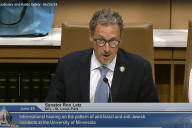You have /5 articles left.
Sign up for a free account or log in.
The New York Times published a special section on privacy in the Sunday paper. I just examined these stories online next to them on paper. The publisher’s essay about how the Times is approaching privacy has 22 items blocked by uBlock Origin, along with 7 third-party trackers according to Privacy Badger. Other articles in the special section had as many as 8 third-party trackers and 25 items blocked. To be fair, articles about privacy in the Washington Post and the Guardian typically have twice as many. Ad revenue has always been important to newspapers, and as papers went online so did the ad business. Google, Facebook, and Amazon (all companies that know lots about us and have the juice to do things with all that data) control nearly 70 percent of the digital ad market.
I hadn't thought about this benefit of reading a paper on paper. Sure, there are ads, but none of them send information to the mothership or resell information about who I am, where I am located, what device I’m using, or whether I actually spent time looking at an ad, nor can any information about my reading habits (apart from having a subscription) be connected to my credit card purchases, my social media activity, my voter registration, or all the other data tied to my identity. My interaction with the paper on paper can’t be used to decide what stories to show me, nor can it be turned over to the government or hacked and resold to others for who knows what purposes, or fool my computer into hosting malware.
These invasions of privacy are stealthy. We don't realize how vulnerable we are, but as consumers increasingly adopt ad blockers to improve their customer experience (a phrase tech companies use without irony as an excuse to violate our privacy), this digital ad revenue model is not sustainable. The European Union, California, and ten other states have passed or are considering privacy regulations lacking at the US federal level.
Beyond ad placement, this stealth invasion of our privacy is taking place in our insurance policies, the HR office, the local police station, our streets, our schools, our workplaces, even our bedrooms. It's a profoundly disturbing and mostly invisible attack on our freedom: the freedom to read, to travel, to associate with others, to learn or work without being constantly watched and nudged, the freedom to decide for ourselves, the freedom to choose how to live our lives.
Don’t believe for a minute that the price of having the internet is a constant digital strip-search, any more than it's required for student learning or getting work done or for public safety. There are other ways to make a buck that doesn’t require us consenting to living buck-naked while being told the lie "your privacy is important to us."





